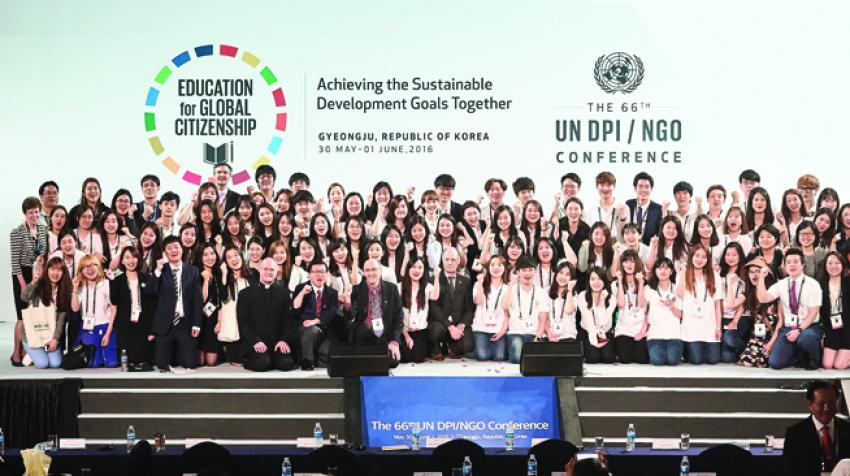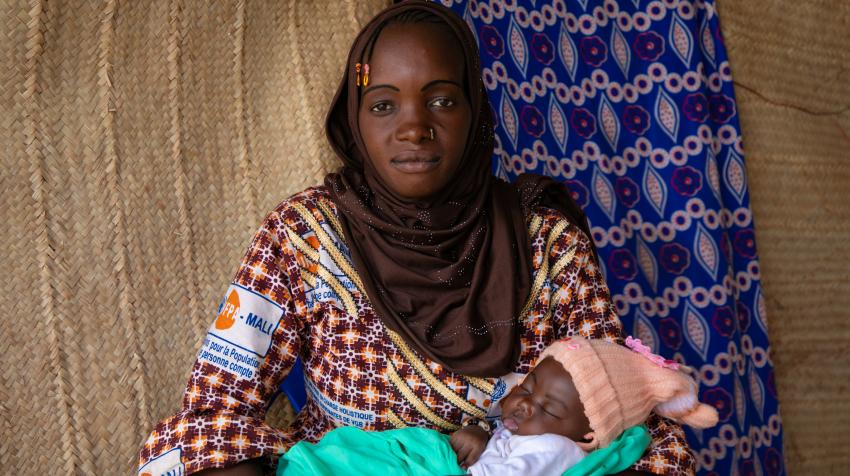It is the responsibility of civil society to experiment with models of effective global citizenship, to understand, care and act on behalf of people and the planet through ecological and socially inclusive principles and practices. Global citizenship is transforming the worlds of art, business, culture, education, human and labour rights, religion, public health, politics and our relationship with nature.
The United Nations is particularly important for global citizenship initiatives. The Charter, which begins with the phrase “We the peoples of the United Nations”, became the first international instrument to popularize the term non-governmental organizations (NGOs). In the face of global crises, the United Nations has achieved several critical milestones in recent years, including the adoption of the Sustainable Development Goals (SDGs) and the Paris Agreement in 2015, and the Treaty on the Prohibition of Nuclear Weapons in 2017. These successes would have been impossible without the vigorous and determined support of thousands of NGOs from around the world. This article explains the importance of the concept of global citizenship for civil society, emphasizing its role in achieving the SDGs.
Global Citizenship and Sustainable Development: A Framework for Peace and Prosperity
Despite its flaws and differing perceptions, global citizenship is one of the most defining paradigm shifts of the contemporary world. We share three complementary viewpoints:
- It is a way of living that recognizes our world as an increasingly complex web of connections and interdependencies, in which our choices and actions may have repercussions for people and communities locally, nationally or internationally.1
- A global citizen is someone who identifies with being part of an emerging world community and whose actions contribute to building this community’s values and practices.2
- Global Citizenship Education (GCED) aims to empower learners to assume active roles to face and resolve global challenges and to become proactive contributors to a more peaceful, tolerant, inclusive and secure world.3
The SDGs and their 169 targets are one of the world’s most meaningful and measurable expressions of global citizenship. The United Nations adopted the SDGs at the seventieth General Assembly in September 2015. Their ultimate realization would be manifested by a world of global citizens responsible for: “Creating a world with sustainable peace—a world without poverty or hunger and where all have health and education. A world where we honor and protect life under water and on land. A world of peace and justice for all.”4
To achieve the SDGs, we must a) understand our global interdependencies; b) strengthen our care and commitment to the world community; and c) prepare the next generations by educating empowered learners who can resolve global challenges. These three complementary themes flow from the viewpoints noted above.
The United Nations Open Working Group (OWG) began formulating the SDGs in 2013. The involvement of NGOs in these negotiations was “unprecedented in their openness and engagement of all key stakeholders.” The OWG organized civil society participation into the following major groups, joined later by other stakeholders: women, children and youth, indigenous peoples, NGOs, local authorities, workers and trade unions, business and industry, scientific and technological community, and farmers.
Without a commitment to global citizenship, the SDGs are merely a set of national commitments. Global citizenship creates a space for vigorous new global partnerships that accelerate progress on achieving the SDGs, which in turn strengthens a new model of shared global prosperity. A spirit of partnership and collaboration is not, however, the dominant mode of global engagement today. On the contrary, as summarized by Torres, the most dominant form of international development is globalization from above, or neoliberal globalization, “which results in competition-based reform consisting of … standardized testing as well as cost-efficiency and privatization of institutions”.5
According to Raskin, in neoliberalism the “circuits of almost everything—goods, money, people, information, ideas, conflict, pathogens, effluvia—spiral round the planet farther and faster.”6 The resulting imbalances are not sustainable, but neither is a retreat into nationalism as some urge. Instead, civil society must strengthen a wide range of international partnerships. This involves rethinking development assumptions.
We are witnessing the emergence of a new understanding of ourselves, a new ontology of life. The science of life and humanity is shifting from a worldview defined by individualism and atomism to one defined by global structures of interdependence. Dr. Martin Luther King, Jr. offers one of the most eloquent expressions of this new ontology: “I am cognizant of the interrelatedness of all communities and states. I cannot sit idly by in Atlanta and not be concerned about what happens in Birmingham. Injustice anywhere is a threat to justice everywhere. We are caught in an inescapable network of mutuality, tied in a single garment of destiny. Whatever affects one directly, affects all indirectly.”7
This is global citizenship as a soulful experience guided by our deepest understandings of truth. We can use science and critical thinking to promote peace. Intercultural dialogue and conflict resolution strategies can reduce human rights violations. Education is a vital tool for eliminating violence against minorities and the disadvantaged. Our challenge is to create a world that affirms the human rights of all peoples by 2030.
Advancing Global Citizenship through Global Partnerships
The United Nations system advances global citizenship practices through many different institutions. Formal relationships with NGOs occur through three primary organs and departments: the Economic and Social Council (ECOSOC), the Department of Public Information (DPI) and the Non-Governmental Liaison Service (UN-NGLS). We focus on our work with DPI.
DPI has partnered with the NGO community for their 66 international conferences to advance shared objectives. The 66th DPI-NGO Conference, hosted in Gyeongju, Republic of Korea, was the first such international conference hosted in Asia. It was a collaboration among DPI, the NGO/DPI Executive Committee, the National Organizing Committee of Korea and the Government of the Republic of Korea.
The conference theme—Education for Global Citizenship: Achieving the Sustainable Development Goals Together—was one of the first opportunities for international NGOs to deliberate on the adopted SDGs. At the conference, NGOs engaged in comprehensive discourse on education for global citizenship and the SDGs. The authors of this article served as co-chairs for the conference, which brought together 3,700 representatives, from 80 nations, and 620 regional and international NGOs. The conference produced the Gyeongju Action Plan (GAP) and the Gyeongju Youth Declaration.
The post-war history and future aspirations of the Republic of Korea inspired the conference. The United Nations played a pivotal role in the rebuilding of the Republic of Korea after the Korean War. The country leveraged investments in education as a tool for lifting its citizens out of poverty. Former Secretary General Ban Ki-moon was one of those students. Today, the Republic of Korea has one of the best elementary and secondary school systems in the world and sees global citizenship as a national responsibility. Just as the world helped the Korean Republic to develop and industrialize, now the country assists developing nations with their social and economic progress.
Ongoing tensions between the South and North also shaped the conference. Speakers discussed their work assisting defectors from the North to assimilate in the South. Today, the Republic of Korea and the Democratic People’s Republic of Korea have different national cultures, including language differences, whose vocabulary now differs up to 50 per cent.8 On what basis would a reunified Korean nation construct new norms and institutions? Global citizenship could provide a common foundation for the two countries. Textbooks, for example, could emphasize global citizenship and the value of harmonizing the two cultures. Solutions to the challenges faced by all nations can be partially addressed through the lens of global citizenship.
On the final day, conference participants adopted GAP, which embodied their spirit, voices, animated discussions and persistent involvement, manifesting the valuable lessons learned at the forum. GAP affirms that “education for global citizenship is an essential strategy to address global challenges as well as to promote gender equality, facilitate the eradication of poverty and hunger, build skills, eliminate corruption, and prevent violence”.9
Among its many recommendations, GAP called for the creation of an International Day of Education for Global Citizenship (IDEGC). Since the conference, an IDEGC Steering Committee has been formed, of which we are founding members. The Committee’s goal is to promote the adoption by the General Assembly of an international day to be placed on the United Nations calendar. GAP specifies that an international day “would serve as a means to promote education for global citizenship, learning for civic engagement, and literacy for grassroots empowerment”.10
Other new initiatives are also helping to expand awareness and support for global citizenship. In New York, the Bahá’í International Community’s United Nations Office facilitates the Coalition for Global Citizenship, which applies the lens of global citizenship to the challenges addressed by the United Nations. Last fall, the Asia Society launched a new Center for Global Education to prepare students for employment and citizenship. In July 2017, Handong Global University held a ground-breaking ceremony for the Ban Ki-moon Global Education Institute in Support of United Nations Academic Impact (UNAI). These and many other initiatives reflect upon an awareness that education for global citizenship can offer relatively inexpensive but effective strategies for strengthening sustainable development this century. Former Deputy Permanent Representative of the Republic of Korea to the United Nations in New York, Ambassador Hahn Choong-hee, recently summarized this transformative potential, stating that global citizenship education “is our over-arching and ultimate goal for all SDGs, even the whole process of the United Nations. This is a common undertaking and it will be this solemn responsibility of our generation for our next generation’s children.”11
There are significant variations in self-identification with global citizenship around the world. In a 2016 GlobeScan poll of 20,000 people from 18 countries, 56 per cent of respondents in emerging economies “saw themselves first and foremost as global citizens rather than national citizens.” In industrialized countries, self-identification with global citizenship peaked in 2009 and is now 42 per cent.12 We caution that this may not be a temporary trend. Much depends on our collective capacity, through new partnerships, to invest in a future that is qualitatively better for both people and our planet. We have tried to explain our rationale for urging such investments.
In conclusion, we invite you to become more inquisitive about global citizenship. By adopting the values and goals articulated in GAP, we can achieve many future successes. We applaud the possibility that almost half of humanity (49 per cent) now identifies with global citizenship.13 Now is not the time for complacency but rather for urgent and principled action. Global citizenship need not supplant nationalism, but instead offers new and healthier opportunities for peaceful and sustainable development. For us, global citizenship is the ultimate expression of nationalism, as it provides the firmest foundation for widely shared prosperity and happiness.
Notes
- International Development Education Association Scotland, “What is global citizenship?”, 2014. Available from http://www.ideas-forum.org.uk/about-us/global-citizenship.
- Ronald C. Israel, “What does it mean to be a global citizen?”, Kosmos (Spring, Summer 2012). Available from http://www.kosmosjournal.org/article/what-does-it-mean-to-be-a-global-ci....
- United Nations Educational, Scientific and Cultural Organization (UNESCO), “Global Citizenship Education,” 2015. Available from http://en.unesco.org/gced.
- Fernando M. Reimers and others, Empowering Global Citizens: A World Course (North Charleston, South Carolina, CreateSpace Independent Publishing Platform, 2016), p. xix.
- Carlos Alberto Torres, “Global citizenship and global universities: the age of global interdependence and cosmopolitanism”, European Journal of Education Research, Development and Policy, vol. 50, No. 3 (September 2015), pp. 262-279, quoted in Chong Jae Lee, “Global citizenship education South Korean post-secondary institutions: towards better education platform (United Nations Academic Impact Korea, Seoul, Republic of Korea, 2016), p. 19.
- Paul Raskin, Journey to Earthland: The Great Transition to Planetary Civilization (Boston, Tellus Institute, 2016), p. 13.
- Martin Luther King, Jr., “Letter from a Birmingham jail”, 16 April 1963, in Why We Can’t Wait, Martin Luther King, Jr., (New York, New American Library, Penguin Group, 1963), p. 65. The PDF of the original document is available from http://okra.stanford.edu/transcription/document_images/undecided/630416-....
- Kwon, “An Analysis of North Korean Refugees’ Korean Language Use, and Policy Suggestions”, The National Institute of Korean Language Journal, 22(3), 31. Vol. 22, No. 3 (2012), p. 31.
- United Nations Department of Public Information, Education for Global Citizenship: The 66th UN DPI/NGO Conference Final Report, Gyeongju, Republic of Korea, 30 May-1 June 2016, p. 70. Available from https://drive.google.com/file/d/0BweITcvMVER0X21EdUVvOEdOeVk/view.
- Ibid., p. 72.
- Asia-Pacific Centre of Education for International Understanding (APCEIU) and the United Nations Educational, Scientific and Cultural Organization, “Value of GCED for the United Nations highlighted in 2017 UN GCED seminar”, 30 June 2017. Available from https://www.gcedclearinghouse.org/news/value-gced-united-nations-highlig....
- GlobeScan, “Global citizenship a growing sentiment among citizens of emerging economies, Global poll,” 27 April 2016. Available from https://www.globescan.com/news-and-analysis/press-releases/press-release....
- Ibidem.
The UN Chronicle is not an official record. It is privileged to host senior United Nations officials as well as distinguished contributors from outside the United Nations system whose views are not necessarily those of the United Nations. Similarly, the boundaries and names shown, and the designations used, in maps or articles do not necessarily imply endorsement or acceptance by the United Nations.




